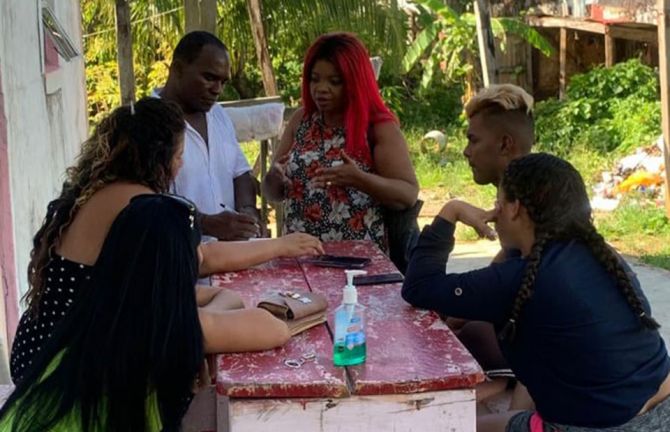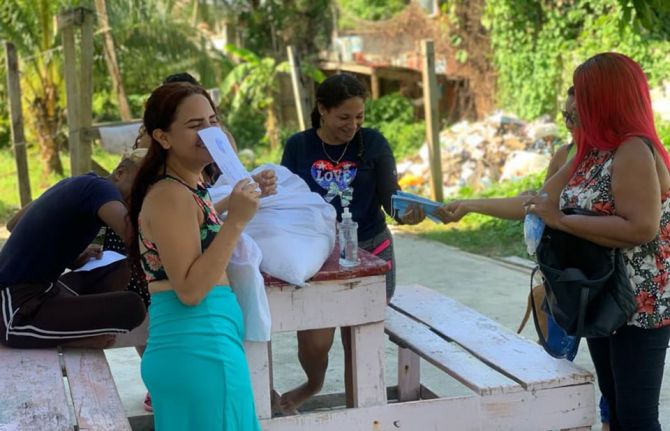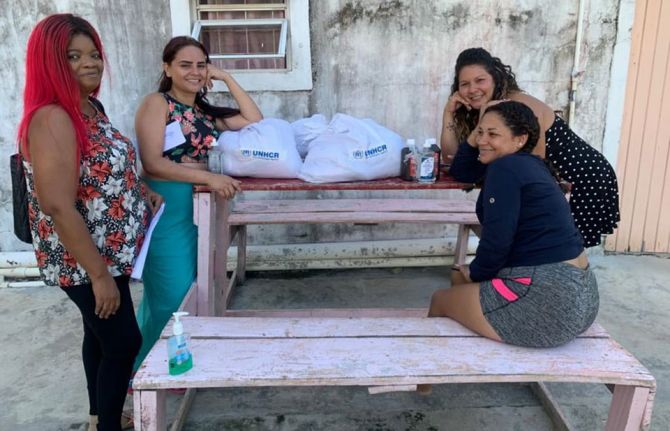



Feature Story
Guyana community organization serves sex workers on the edge during COVID-19
29 July 2020
29 July 2020 29 July 2020The town of Corriverton in Guyana lies far east, on the Suriname border. Miriam Edwards, the Executive Director of the Guyana Sex Work Coalition, hired a taxi early last Thursday to take her team of peer counsellors there. They planned to conduct welfare checks, offer HIV testing and distribute care packages, masks and condoms as part of a project supported by the Office of the United Nations High Commissioner for Refugees (UNHCR). It’s a nearly 200-mile trip from the capital, Georgetown. Since the COVID-19 outbreak, the regular bus hasn’t been available. Other changes to the flow of life have been devastating for sex workers in Guyana.
“Because of the curfew they are not able to work. Plus the children are home full time. They (the sex workers) can’t make any moves. Some are able to look (work) for money, but in doing so they take more risk. Workshops are not their first priority,” Ms Edwards says plainly. “Their main need is food and sanitization.”
COVID-19 has meant fewer opportunities for work and more competition. A Dominican sex worker reported being attacked by a pair of local women. Her face was swollen and stitched when Ms Edwards got to Corriverton.
One Venezuelan woman ventured out during the curfew. She alleges that police officers in the border town detained her and demanded sex. When she refused, one of them hit her with his gun.
Another Venezuelan sex worker had gone missing since the previous weekend. Her documents and clothes were left in her hotel room, but she still hasn’t turned up.
The complications around sex work in Guyana have deepened since COVID-19. At a time when many locals are out of work, migrants have been particularly affected by joblessness. More of them are exchanging sex for money to survive.
According to a recent Response for Venezuelans (R4V) report by UNHCR and the International Organization for Migration, there have been more reports of sex workers facing eviction or being at risk due to job loss.
“This situation increased their vulnerability of becoming victims of human trafficking, exploitation and gender-based violence,” the report says.
Meanwhile, many Guyanese sex workers have found it difficult to access the social support provided for formal-sector workers by the government.
“The problem is that many in authority don’t see sex work as work,” Ms Edwards said.
But some do. According to Rhonda Moore, Programme Manager at the National AIDS Programme, during COVID-19 the HIV Food Bank has expanded its reach to HIV-negative members of key populations. This includes female, male and transgender sex workers.
Ms Edwards points to the need for even more targeted social support, including for single mothers, migrants and those working in the interior.
The Guyana Sex Work Coalition’s strategy has been to pair the distribution of nutrition support and hygiene supplies with offers of HIV testing and safety reminders on COVID-19, HIV and sexually transmitted infections. According to Ms Edwards, this is a time of high stress and uncertainty and her clients are not necessarily able to absorb mass media messages. Text reminders and phone calls have been key approaches to ensuring that individual sex workers are informed and to address their unique challenges. Sometimes they need medication or money for transport. Many of the migrants need a safe space.
UNAIDS is embarking on a project with the Caribbean Sex Work Coalition to help national networks address sex workers’ knowledge, HIV prevention and social support needs during COVID-19. A major goal of the project is region-wide advocacy to encourage Caribbean governments to include sex workers in their planning and protection.
“Sex workers need to be included in national social protection schemes and many of them need emergency financial support,” said James Guwani, Director of the UNAIDS Caribbean Sub-Regional Office. “To win the battle against COVID-19 or HIV, we must give life to the principle of leaving no one behind.”



